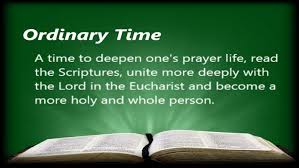I am a leaf peeper! Fall foliage is one of the reasons why autumn is my favorite season. Why the leaves? What do they mean to me? The autumn leaves speak to me of God's beauty in the complex blend of their multiple colors on the trees around us. I look forward to a leaf-peeping drive to Jim Thorpe or PA 322 to State College every autumn. You will get a good view of fall foliage from a restaurant called "The View " at State College if you ever visit before it loses its color. You can also experience the awesomeness of fall leaves locally by standing in front of the church on the hill and looking across to the Stone Gable grounds. They are gorgeous and speak to us of the glory and beauty of God, and they bring to life the words of the Psalmist: "Let the field exult, and everything in it! Then shall all the trees of the wood sing for joy before the Lord" (96: 12-13).
Autumn foliage speaks to us of God's beauty and living presence but also tells us of decay. The dead and fallen leaves remind us of our fragile human lives, which is like "a mist that appears for a little time and then vanishes" (James 4: 14). As I type this message, I see the eye-arresting autumn leaves falling off the trees across the rectory kitchen on East Park Street. They are dying, the fall leaves, even in their beauty. The lovely sight before me will soon give way to greyness, dryness, and emptiness. In all their radiant beauty, fall leaves also speak to us of death and judgment. Death puts an end to human life, and the soul immediately receives a particular judgment, which, depending on the state of the soul, leads it to one of three states: purgatory, heaven, or hell. A soul that goes to purgatory, a place and period of purification, is bound for its definitive state in heaven. Here is how the Church describes judgment after death and purgatory:
"All who die in God's grace, but still imperfectly purified, are indeed assured of their eternal salvation; but after their death they undergo purification, so as to achieve the holiness necessary to enter the joy of heaven" (CCC 1030).
A parishioner shared an experience she had with a Christian neighbor who does not believe in purgatory and praying for the dead. This "bible-believing" Christian, she said to me, denounces the Catholic belief and practice of offering suffrages for the dead because her reading of the bible does not suggest it. Nothing more is far from the truth! Such a declaration is an honest misreading of the bible. The Catholic understanding of select scripture passages (Mt 12: 32; Mt 5: 24-26; 1 Cor 3: 11-15; Rev. 21:27; Hab 1:13; 2 Mac 12: 39-46, e.t.c. ) and her sacred tradition supports the pious and noble practice of praying for the dead who died in the state of grace but are delayed from attaining the beatific vision of God because of some traces of imperfection in their soul that need purification, cleansing by fire.
As a labor of love and in obedience to the teaching of the Church derived from Scripture and Tradition, Catholics are strongly encouraged to pray for the dead more intensely and corporately in November. As the Ordo says, "During November, we are called in a special way to remember 'our brothers and sisters who have fallen asleep in the hope of the resurrection' (Eucharistic Prayer II)."
As a parish, we had a mass explicitly offered for all our parishioners who had passed on in the last year last Thursday evening, the memorial of the Commemoration of all the Faithful departed (All Souls' Day). We have also made a book available and envelopes to inscribe the names of our dead family members and friends remembered at masses on All Souls Day and throughout masses celebrated in November. The Church has always encouraged, in addition to mass, the pious acts of almsgiving, works of penance, and gaining of indulgence on behalf of the dead:
"Let us help commemorate them. If Job's sons were purified by their father's sacrifice, why would we doubt that our offerings for the dead bring them some consolation? Let us not hesitate to help those who have died and to offer our prayers for them" (St. John Chrystostom).
One more example of noble acts of love and remembrance of the dead is the Catholic tradition of visiting the graves of loved ones on All Souls Day and through the month of November. We visited and prayed for the souls in our cemetery, and hopefully, we gained plenary indulgence for souls there still held in purgatory. Typically, plenary indulgence is granted when visits are made from November 1-8, and partial indulgence on other days in November and the year. Three conditions must be fulfilled to acquire this grace for our dead loved ones: sacramental confession, Eucharistic communion, and prayer for the Pope's intention (incidentally, the Pope's intention for November is to pray for the Pope).
Please remember to pray for your loved ones, especially in November. It is a holy and lovely deed. The Bible, Sacred Tradition, and the Magisterium support this divine act of love. All I have spoken about so far is not human teaching but, indeed, the sacred word of God. In conclusion, I echo the words of St. Paul: "In receiving the word of God from hearing us, you received not a human word but, as it truly is, the word of God, which is at work in you who believe" ( 1 Thes 2: 13).
In His Joy,
Fr. Alayode Bernard, OP

 RSS Feed
RSS Feed